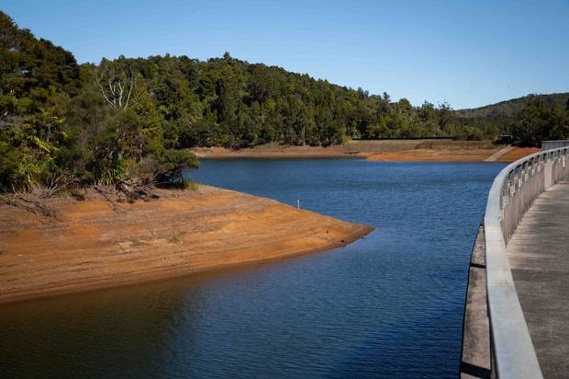
Auckland is essentially under water restrictions for the first time since the early 1990s as the region's storage dams drop below 50 per cent amid a severe drought.
Watercare chief executive Raveen Jaduram told the Herald the only element missing from making restrictions official was enforcement, which they were avoiding due to Covid-19.
"We don't want our staff going door to door checking, which would normally be happening, but essentially we are now at level 1 restrictions."
In absence of enforcement, Watercare was calling on Aucklanders to all do their bit to conserve water, including cutting showers to four minutes and avoiding any outdoor use, meanwhile continuing essential hygiene measures associated with containing Covid-19.
Under usual circumstances restrictions would kick in at about 51 per cent during autumn, Jaduram said.
Amid a dry start to the month and on the back of a summer that saw just 35 per cent of average rainfall, the city's storage dams on Thursday dropped to 49.7 per cent - the first time they'd fallen below 50 per cent since the drought of 1993/1994, when storage levels got down to a frightening 36 per cent.
The historical average for this time of year is about 77 per cent.
"It is not a good feeling," said Jaduram.
Watercare had been encouraging Aucklanders to cut back on water consumption since February, when storage was at about 70 per cent.
At the peak of usage in February the city was swallowing up 565 million litres a day, but since then, amid the Covid-19 lockdown which has reduced industrial usage and calls for voluntary cuts, demand has fallen greatly.
For the past seven days usage has averaged at about 450 million litres a day.
To reduce pressure on the 10 storage dams spread across the Waitākere and Hunua ranges, Watercare had been drawing its maximum permitted 150 million litres a day from the Waikato River for several months.
But without any major rainfall to top up the dams, capacity would continue to fall.
Niwa meteorologist Ben Noll said it has been an "incredibly dry stretch", going all the way back to late 2019 for Auckland, with northern areas still under meteorological drought.
Even several fronts over the past few weeks that had ended droughts in other parts of the country had missed Auckland.
The good, or slightly better, news was that the next month or two showed average and even slightly above-average rainfall.
"Over the next few days we see a few opportunities for rainfall, with a decent front moving over the region tomorrow and into Saturday. We could see 20 to 30mm fall in places by Monday.
"Then next week a disturbance from the subtropics will bring more rainfall.
"So we may finally be moving away from a run of frequent high pressure systems to a more typical autumn, and continuing into May."
But Jaduram said it would take "a lot of rain over a lot of days" to get back to where the storage levels needed to be.
"We've had a few showers recently, and that suppresses demand. It stops people going outside and washing their cars or watering the garden.
"When it rains we get double benefit, as people stay inside and our dams also fill up.
"But when its fine weather, as it has been, people use more and the dams dry up, and the system is really stretched.
"Our key message is that if we were not experiencing Covid-19 we would be in formal restrictions. We need to moderate the situation given people are already under stress.
"But this is a serious situation. This means not doing things like washing your car, watering your garden - really doing all you can to only use water for essential purposes.
"During the Tasman Tempest in 2017 we asked people to save 20 litres a day, and we achieved that. We can't enforce these restrictions, so we are relying heavily on Aucklanders taking action themselves."
The next level of restricitons would come in if dam levels dropped to 35 per cent, and would involve cuts to industry as well.
"But we don't even want to be thinking about that, and if we all do our bit that won't happen," Jaduram said.
Watercare's advice to Aucklanders
- Keep washing your hands regularly
- Keep your showers short: 4 minutes or less
- Only run your dishwasher or washing machine when they're full
- Don't wash the car
- Don't waterblast the house or driveway
Take your Radio, Podcasts and Music with you








